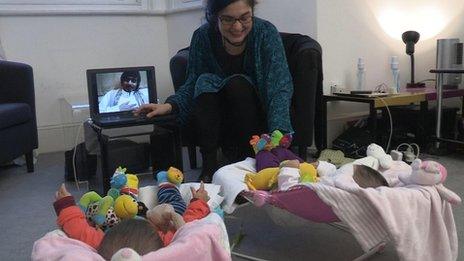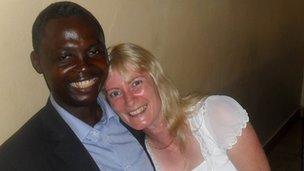Does migrants' English test split families?
- Published

Two years after the government introduced a test to prove husbands and wives from outside Europe could speak English before they were allowed to join partners in Britain, campaigners say families are being split up.
"Say hello to Layla, Daddy, say hello."
Liz Farrow sits in front of Skype in her London flat with her four-month-old twins Layla and Zak. On the other end of the line they can see their father, Abdullah Al-Qasli.
But this is the only way they get to see him, because Abdullah lives in Jordan.
"We miss you," she says as she turns the computer to face the twin's smiling faces. This is how Abdullah communicates with his children.
He is originally from Yemen but has moved to Jordan to try to learn English - so far he has failed the English test twice. He and Liz chat largely in Arabic - their shared language.
"It's an absolute nightmare - after you get married and especially after you have kids you want to be together," says Liz.
"You want to spend your life together. But because of this law I'm basically a single mother - we feel really hopeless."
Liz agrees that immigrant spouses should learn English but does not agree they should have to do it before they arrive.
"I think it's very sensible - but people should learn English in England. Abdullah is an educated man - he was a headmaster in Yemen and he will pass the test, but once he's fully immersed in society here."
In Plymouth, the situation is similar for Nicki Nana - she is British and has been married to Jonadap from Cameroon for almost two years.
He speaks French, and - according to Nicki - competent English. But he also has failed the test twice.
"This test has put a lot of strain on my husband and me because he has to pass this test before he comes to the UK. I believe when two people get married they become one but we can't be.
"I have many sleepless nights, I cry, I just want to be with my husband. In my opinion the only way my husband can understand more English is when he is living here with me," says Nicki.
The English language requirement was introduced in November 2010.
Overseas spouses (from outside the European Economic Area) wanting to move to the UK to join British partners now have to pass a number of approved tests to show their English is up to standard.
If a migrant is a national of a majority English-speaking country, they meet the English language requirement automatically and do not need to take a test - a factor campaigners believe unfair.
The Joint Council for the Welfare of Immigrants (JCWI) wants the government to scrap the test - it says that breaking up families is more damaging than some migrants not speaking English.
"You have to think about people's fundamental rights," says Habib Rahman of the JCWI.
"People for their own interest - when they come to the country - will learn English. The best country to learn in is here."
But some migrants are in agreement with the government.
Madiha Sarwar had to take the language test in Lahore in Pakistan before joining her husband in east London, and says it has given her an advantage over those who did not speak English before they arrived.
"If you don't speak English it's really very difficult, you can't communicate with anyone, you can't speak to the doctor, you can't tell anyone if you have any problems."
The government says speaking English is key to integrating into life in the UK.
"We're not asking everyone to be at degree level," says Immigration Minister Mark Harper.

Jonadap has twice failed the test and remains separated from his wife, Nicki
"We're asking people to get to a level where you can do relatively straightforward social interaction, a telephone call with somebody, speak to someone in a shop.
"They can get jobs - and you can't do that really unless you have a good grasp of the English language," says Mr Harper.
For Liz Farrow, the concern is that her husband's English cannot improve sufficiently while he is not resident in England.
"People are speaking Arabic to him all the time in Jordan, and even when he tried to practice his English people speak back to him in Arabic. He finds it very frustrating to try and learn a language in a very short amount of time, to try and be with us."
- Published16 December 2011
- Published9 June 2010